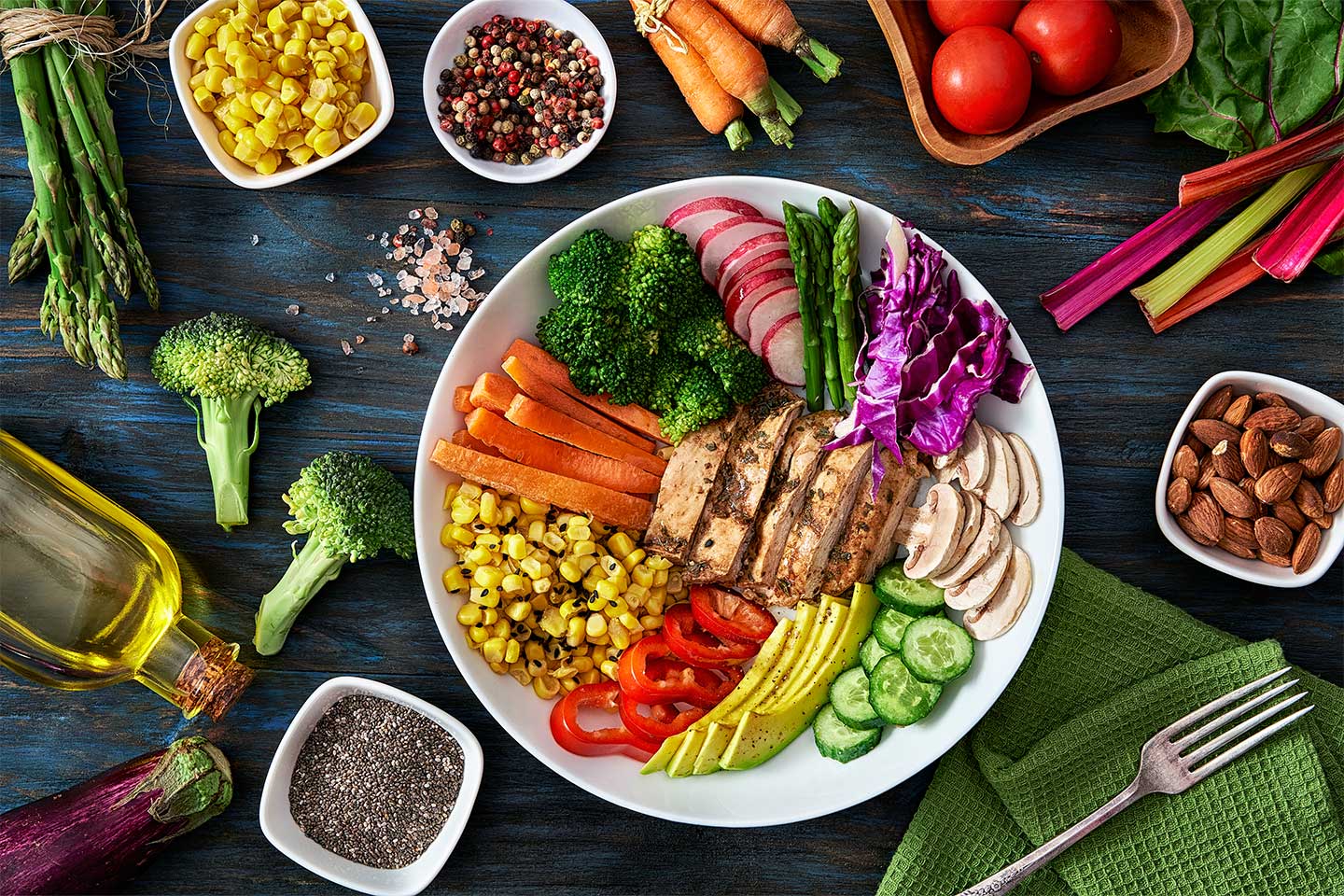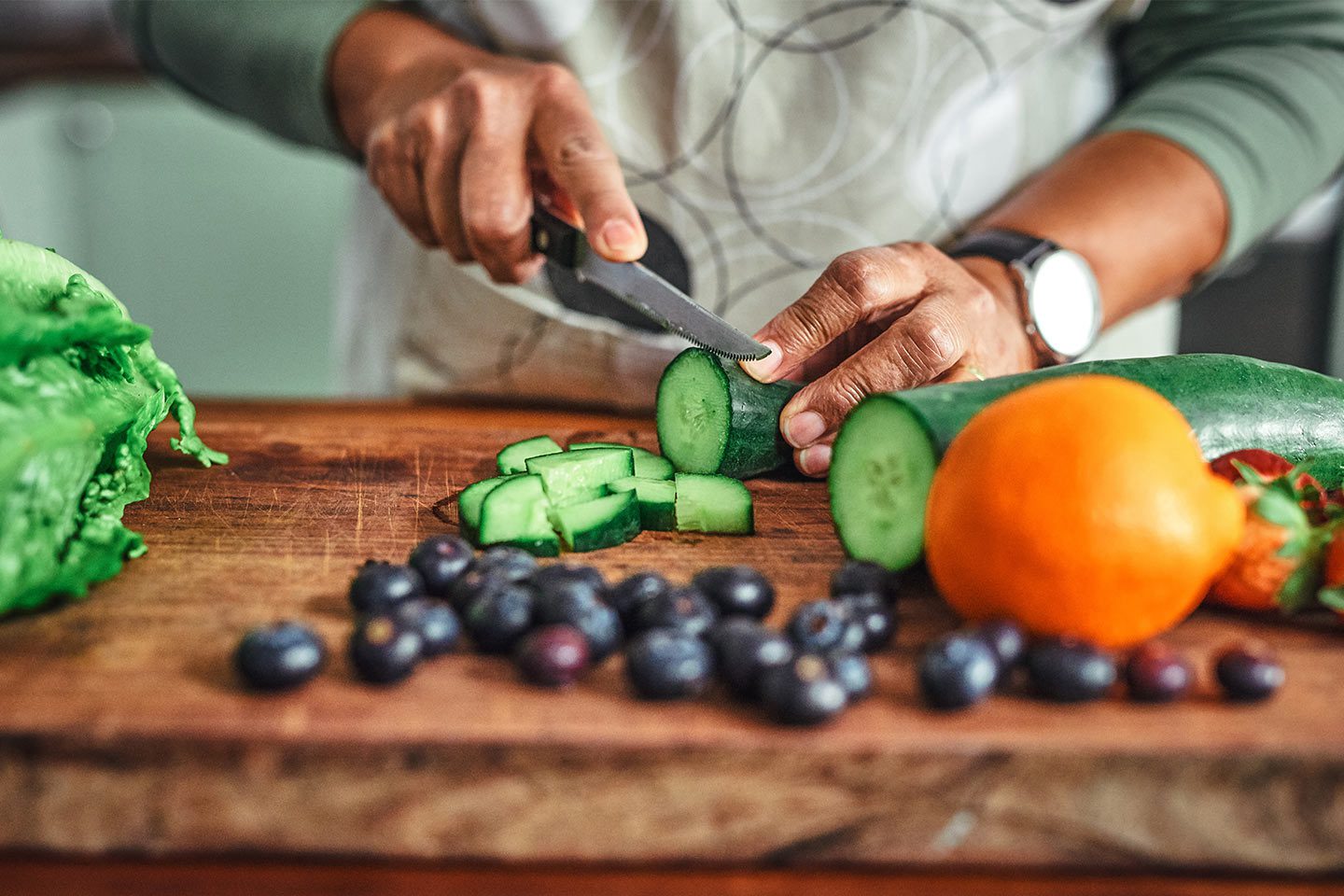Eating takes up a big part of our waking hours and we spend a lot of money just to feed ourselves.
But with the variety of foods available to us at every turn, do we eat for health? For some time now, talk of “whole foods” has captured people’s attention, and the concept is catching on. So what’s driving this trend away from processed foods and toward fruits, vegetables, whole grains and unprocessed meats? The reason may be that the kind of food we eat does matter, and whole foods in your diet can contribute to a healthier you.
What Are “Whole Foods”?
Perhaps like many, you have a fuzzy definition of what whole foods are. You may associate them with organic, locally grown, or pesticide-free foods. But while “whole foods” can be all of these things, they aren’t defined by these characteristics. By definition, whole foods are foods left unaltered by human intervention. “A whole food is a food in its natural state that has not been processed. It’s straight from nature,” says Madison Jahn, a registered dietitian with Erlanger Health System.
This is food in its original state, with all of its natural vitamins, minerals and other nutrients, as opposed to what is left over after a food has been refined or processed. It’s the difference between an apple and apple juice, or a baked potato and mashed potatoes.


Reasons to Avoid Processed Foods
In contrast to a regular diet of whole foods, a regular diet of processed foods may lead to many diseases. The CDC reports that regular consumption of processed foods contributes to weight gain and obesity. Overweight and obese individuals are at increased risk for many diseases and conditions including high blood pressure, type 2 diabetes, coronary heart disease and stroke. Nutrition experts cite other disadvantages of processed foods and give us reasons why we should avoid them as much as possible.
Consider the following:
- Processed foods contain additives and preservatives and are often high in sodium, which can lead to high blood pressure and hypertension. The USDA Center for Nutrition Policy says most of the sodium in the American diet comes from processed foods.
- Processed foods may contain hydrogenated oils, which are known to clog the arteries.
- Processed foods may contain hidden allergens that trigger harmful reactions in people with allergies.
- Some prepared foods are high in sugar since heavy processing often removes the nutrients necessary for health and replaces them with fats, salt and sugar. The Mayo Clinic reports that a diet high in added sugars can lead to tooth decay, weight gain, and increased triglycerides, which can increase risk of heart disease.
- The high calorie count and low fiber content of processed foods can contribute to overeating, which leads to weight gain. You don’t feel as full as you would when eating high fiber foods.
- Eating processed meats has been associated with an increased risk of heart disease. A 2010 Harvard study found that consumption of processed meats—such as bacon, sausage and some deli items—was associated with a 42 percent higher risk of heart disease as well as a 19 percent higher risk of Type 2 diabetes. “Processed meat—like the turkey and ham that you buy—has a lot of salt and preservatives. It’s a better option to buy a whole turkey or a whole chicken and dodge that risk,” Jahn says.
The Whole Foods Advantage
Nutritionists agree that whole foods have a clear advantage when trying to eat a healthier diet. Consider the following benefits:
- The nutrients in whole foods may help to keep your immune system strong. The Cleveland Clinic recommends eating a diet rich in fruits, A cholesterol molecule vegetables, greens and whole grains to help protect your body from disease.
- Whole foods are frequently loaded with fiber. Whole grains, greens and fresh fruits and vegetables contain fiber, which can help reduce cholesterol levels and lower your risk of heart disease. In refined grains, some of the vitamins and iron may be added back after processing, but usually not fiber.
- Phytochemicals, powerful chemical compounds found in plants, contribute greatly to health. Most phytochemicals have antioxidant activity that protects the body’s cells against damage. The only way to ensure you’re getting the phytochemicals you need is to eat plant foods in their natural state.
- Whole foods contain abundant vitamins and minerals. According to a USDA national survey, almost one-third of us don’t get enough vitamin C, and about one-half get too little vitamin A. An easy way to correct the problem is to eat a diet rich in whole foods. According to researchers, almost all of the shortfalls identified by the survey could be corrected by eating a balanced, mostly plant-based diet.
- Weight loss may be one of the added benefits of eating whole foods because the natural fiber in fruits and vegetables may fill you up without adding many calories.
Jahn says that if you do decide to purchase a processed food, checking the ingredients is key. “It’s so important to read the label,” she says. “If you see the words ‘hydrogenated’ or ‘partially hydrogenated,’ avoid it. Be wary of peanut butter, cereal bars, breakfast bars. They can hide it in everything. There is no definitive list. If you don’t recognize something or can’t pronounce it, don’t buy it.”



Making it Affordable and Practical
Many Americans worry about not being able to afford adding healthful whole foods to their diet. If this is you, here are some helpful tips from the USDA Nutrition Education Series and other sources about cost-effectively incorporating healthy food into your diet:
- Plan your meals before leaving for the grocery store.
- Check the newspapers and the stores where you shop to take advantage of the sales.
- Consider purchasing whole foods that have low prices year-round, such as beans, carrots, greens, potatoes, apples and bananas.
- Be creative with leftovers. For example, use chicken in a stir-fry or as a garnish to salad.
- Look for fruits and vegetables in season, which are easier to get, have more flavor, and cost less. Your local farmers market offers great deals on seasonal produce.
- Regularly buy small amounts of fruits and vegetables. You’ll be more likely to eat them before they rot.
Space permitting, plant a garden and have fresh produce of your own, or “cultivate” potted gardens with peppers, herbs and tomatoes.
When going grocery store shopping, Jahn recommends sticking to the outskirts of the store, where you’ll be more likely to find fresh foods, dairy, fresh meat, and frozen whole foods. “Frozen is the next best thing to buying fresh when it comes to buying whole foods. It’s usually cheaper, and sometimes even better because it’s picked right when it’s fresh.” She also recommends purchasing food from a farmer’s market. “We have a lot here [in Chattanooga], and regardless of where you live, it’s not hard to find one.”
Knowing what whole foods can do for you—keep your body strong and fight disease—can inspire you to begin making them a larger part of your daily diet. Optimum nutrition is now within your reach. Choose to eat for both health and enjoyment.
Judith P. Nembhard is a Chattanooga resident. She is a graduate of the University of Maryland where she received her Ph.D. in English education. Judith is a member of the Chattanooga Writers Guild and has two sons. Judith is a lifelong educator and a published writer.

